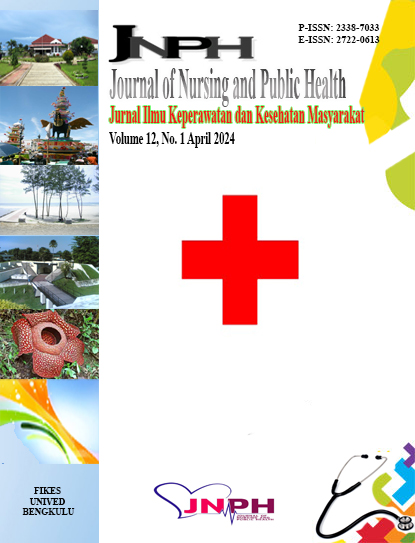PENGARUH HUBUNGAN INTERPERSONAL TERHADAP STRESS KERJA PADA GURU DI SD NEGERI X SELAMA PEMBELAJARAN TATAP MUKA TERBATAS
Abstract
Pendahuluan: Dampak covid-19 terhadap dunia pendidikan sangat besar dan dirasakan oleh berbagai pihak terutama guru, kepala sekolah, peserta didik dan orang tua. Salah satu keputusan pemerintah yaitu proses pembelajaran tetap berlangsung tapi tidak dengan tatap muka melainkan dengan online. Berbagai masalah muncul akibat pembelajaran online seperti situasi rumah yang tidak mendukung, masalah koneksi, dan sulitnya komunikasi juga dapat menyebabkan stress. Penelitian ini bertujuan untuk melakukan analisis hubungan antara hubungan interpersonal dengan stress kerja yang dialami oleh Guru SDN X Jakarta Timur. Metode: Jenis penelitian yang digunakan yaitu kuantitatif desain studi crossectional. Sebanyak 31 Guru di SDN X terlibat dalam penelitian ini. Pengambilan sampel menggunakan metode simple random sampling. Hasil dan Pembahasan: hubungan interpersonal yang dialami guru sebagian besar termasuk dalam kategori hubungan yang tidak baik. Sebagian besar guru di SDN X mengalami stress kerja.. Hasil uji korelasi menunjukkan bahwa terdapat hubungan antara hubungan interpersonal dengan stress kerja yang dialami oleh Guru (P Value 0,006) dengan koefisien korelasi sebesar 0,438. Kesimpulan: Hubungan interpersonal yang tidak baik menyebabkan stress kerja oleh karena itu upaya yang perlu dilakukan oleh sekolah seperti berkumpul bersama secara rutin, dan perlu dilakukan gathering/ rekreasi bersama untuk menciptkan hubungan dan komunikasi yang lebih baik dan bisa lebih mengenal karakter dari masing-masing Guru.
Downloads
References
Mastura, M., & Santaria, R. Dampak Pandemi Covid-19 terhadap Proses Pengajaran Bagi Guru dan Siswa. Jurnal Studi Guru Dan Pembelajaran, 3(2), 289-295. 2020. https://doi.org/10.30605/jsgp.3.2.2020.293
Simmons, D. E. (2002). The Forum Report: E-learning Adoption Rates and Barriers. The ASTD e-Learning Handbook, 19-23. 2002.
Arismunandar, A., Nurhikmah H, N. H., & Wahed, A. Manajemen Stres Kerja Guru. Badan Penerbit Universitas Negeri Makassar. 2020.
Weken, M. E., Mongan, A. E., & Kekenusa, J. S. Indonesian Journal of Public Health and Community Medicine. 1(2016), 80–88. 2020. https://doi.org/https://doi.org/10.35801/ijphcm.1.4.2020.32139.
Schaffhauser, D. Educators Feeling Stressed, Anxious, Overwhelmed and Capable. Woodland Hills: The Journal. 2020. https://thejournal.com/articles/2020/06/02/survey-teachers-feelingstressed-anxious-overwhelmed-and-capable.aspx
Fathonah, S., & Renhoran, C. R. Gambaran Tingkat Stres Guru Madrasah Aliyah di Jakarta Selatan Selama Masa Pandemi. Jurnal Pendidikan Islam, 12(1), 57-71. 2021. https://journal.uhamka.ac.id/index.php/jpi/article/view/7004
Indra, R., Christifera Lian, G., Abigail, J., Putri, I., Valencia, L., Sifra, E., Yosua, I. Gambaran Stres Kerja dan Koping Guru SMA saat Pembelajaran Daring selama Pandemi. Mind Set Edisi Khusus TIN, 1 (1), 63–86. 2021. https://journal.univpancasila.ac.id/index.php/mindset/article/view/2577
Anita, T., Tjitrosumarto, S., & Setyohadi, J. S. Stres Kerja Guru Saat Pandemi COVID-19 Ditinjau dari Kompensasi dan Lingkungan Kerja. 7(1), 146–157. 2021.
Wisnuwardhani, Dian., & Mashoedi, Sri fatmafati. Hubungan Interpersonal. Jakarta: Salemba Humanika. 2012
Nasir, Abdul. Komunikasi dalam keperawatan teori dan aplikasi. Jakarta: Salemba Medika. 2009.
Anoraga, P. Psikologi kerja. Cetakan keempat. Jakarta: Rinena Cipta. 2006.
Vanchapo, A. R. Beban Kerja Dan Stres Kerja. pertama. ed. Arsalan Namira. Pasuruan, Jawa Timur: CV. Penerbit Qiara media. 2020.
Harmsen, R., Helms-Lorenz, M., Maulana, R., & van Veen, K. The relationship between beginning teachers’ stress causes, stress responses, teaching behaviour and attrition. Teachers and Teaching: Theory and Practice, 24(6), 626–643. 2018.
Mahan, P. L., Mahan, M. P., Park, N. J., Shelton, C., Brown, K. C., & Weaver, M. T. Work environment stressors, social support, anxiety, and depression among secondary school teachers. AAOHN Journal : Official Journal of the American Association of Occupational Health Nurses, 58(5), 197–205. 2010.
Mujtaba, T., & Reiss, M. Factors that lead to positive or negative stress in secondary school teachers of mathematics and science. Oxford Review of Education, 39(5), 627–648. 2013. https://doi.org/10.1080/03054985.2013.8402
Harmsen, R., Helms-Lorenz, M., Maulana, R., & van Veen, K. The longitudinal effects of induction on beginning teachers’ stress. British Journal of Educational Psychology, 89(2), 259–287. 2019. https://doi.org/10.1111/bjep.12238
Boshoff, S. M., Potgieter, J. C., Ellis, S. M., Mentz, K., & Malan, L. Validation of the Teacher Stress Inventory (TSI) in a multicultural context: The sabpa study. South African Journal of Education, 38(1), 1–13. 2018. https://files.eric.ed.gov/fulltext/EJ1204393

Copyright (c) 2024 IZZATU MILLAH, ALVIANI PUTRI PRILIANA, PUTRI HANDAYANI

This work is licensed under a Creative Commons Attribution-ShareAlike 4.0 International License.
An author who publishes in the Journal of Nursing and Public Health agrees to the following terms:
Author retains the copyright and grants the journal the right of first publication of the work simultaneously licensed under the Creative Commons Attribution-ShareAlike 4.0 License that allows others to share the work with an acknowledgement of the work's authorship and initial publication in this journal
Submission of a manuscript implies that the submitted work has not been published before (except as part of a thesis or report, or abstract); that it is not under consideration for publication elsewhere; that its publication has been approved by all co-authors. If and when the manuscript is accepted for publication, the author(s) still hold the copyright and retain publishing rights without restrictions. For the new invention, authors are suggested to manage its patent before published. The license type is CC-BY-SA 4.0.
Journal of Nursing and Public Health is licensed under a Creative Commons Attribution-ShareAlike 4.0 International License.
You are free to:
Share — copy and redistribute the material in any medium or format
Adapt — remix, transform, and build upon the material
for any purpose, even commercially.
The licensor cannot revoke these freedoms as long as you follow the license terms.









